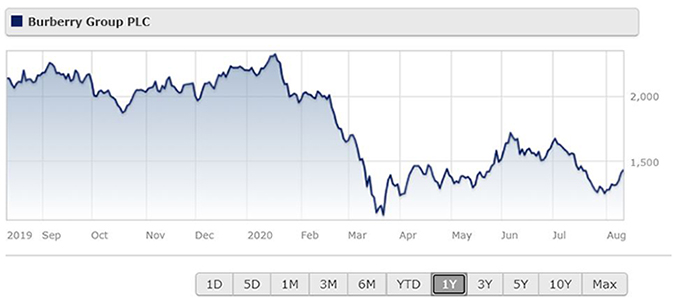
Luxury fashion firm Burberry is the second winner of our Stock of the Week poll, as voted for by our Twitter followers. It’s the only British firm of its kind in the FTSE 100 and has a global reach, with the majority of its sales coming from Asia, where the growing middle class has made luxury spending a priority.
With its dependence on airport spending and China, for Burberry (BRBY) the coronavirus outbreak posed a serious threat to the company’s key markets, and shares halved in the first three months of this year. Sales were down nearly 50% in the three months to the end of June, the company’s first quarter. But with the Chinese economy re-opening and international travel resuming, shares recovered sharply, rising 70% from their March lows.
During the Covid-19 crisis, the company re-tooled a Yorkshire factory that in normal times would be making trenchcoats to make personal protective equipment (PPE) for the NHS. This move helped boost its credentials with ESG investors for having a positive impact on the "S" or social side of the business.
Morningstar luxury analyst Jelena Sokolova rates Burberry as a four-star stock, which means it’s currently undervalued – at around £14, the shares are a way off their fair value of £18.40. The company has a narrow moat because of its brand heritage and distribution strengths, Sokolova says, but has a high uncertainty rating because the coronavirus risk still “could have long-lasting negative implications on consumer sentiment and incomes”.
Burberry is held by a number of Morningstar rated funds. Nick Train, who describes Burberry as a “rare and valuable asset” holds chunky positions in the company in the Silver-rated Finsbury Growth & Income Trust (FGT) and Lindsell Train UK Equity Fund. Richard Buxton, who runs the Silver-rated Merian UK Alpha Fund, also holds Burberry.

Asia Sales Resilient
Here’s what Morningstar’s Sokolova says about Burberry after its most recent set of results in July, which covered the period when most economies were in lockdown and stores were closed:
“We maintain our fair value estimate for narrow-moat Burberry Group as the firm reported a 48% decline in sales in the first quarter. This was slightly ahead of our expectations for a 50% drop in the first quarter as this period was highly affected by coronavirus containment measures and store closures. In June revenue declines eased to -20%, and mainland China and South Korea saw rises in revenue on last year."
She notes that the sales picture across the world is very mixed: sales were down 10% in Asia during the quarter - but were actually up in China during that period - and this was much worse in Europe, Middle East and Africa, India and the United States, where sales were down around 70%. However in the US, where tourist spending on luxury goods like handbags dropped off a cliff, domestic shoppers took up some of the slack.
Like many companies, Burberry is not making any concrete predictions for the rest of the financial year. It's very cautious on the second quarter, Sokolova says, predicting a 15-20% decline in retail sales in the second quarter (compared to the same period last year) and a sharp fall in profit margins.




























